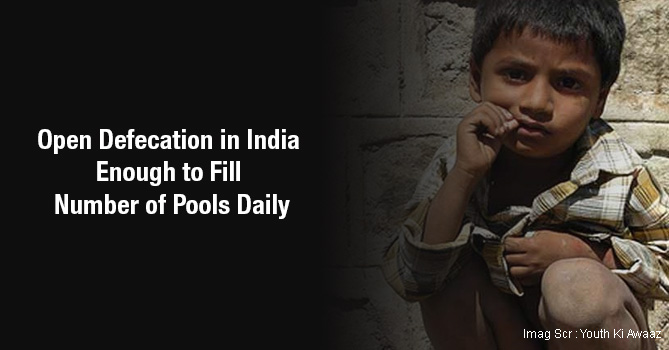India is looking to ride the wave of development and aiming to do so at a breakneck speed. One major part of such development is expanding the cities. On the flipside, one also needs to consider the fact that India, perhaps, has the largest amount of people in the world who live in urban areas and yet do not have access to private – and thus, safe – toilets. This has happened in spite of the fact that government has placed immense priority on sanitation. As per a report by a global NGO, the number of people who live in urban spaces without private toilets is estimated at around 157 million.
Open defecation in India
The number of people in urban areas that practice open defecation is 41 million. This NGO named WaterAid is based in the UK and works in the domain of sanitation and safe water. Its report is named Overflowing Cities – The State of the World’s Toilets 2016 and is the second such yearly report by the group that has been looking at the condition of toilets across the world. In fact, this year it studied the condition of at least 700 million people living in urban areas around the globe without any proper sanitation. The report was released a day before the World Toilet Day, which is celebrated on 19th November every year.
Enormity of the situation
The said report states that due to a high level of population density in the urban areas, diseases can spread around in a rather short span of time. This is especially applicable when proper sanitation facilities are lacking. In fact, the report has stated that the amount of waste generated through open defecation in the streets of cities and towns in India can easily fill up eight swimming pools every day, and that too of the size that is used in the Summer Olympics! In fact, the same amount of faeces can fill up 16 jumbo jets a day.
Migration
The report has mentioned that, at present, India is seeing the biggest migration from rural to urban areas in the recent history. It has also stated that the Swachh Bharat Campaign, started by Narendra Modi, emphasizes the fact that it is only when the cities and towns in India grow in an equitable and sustainable manner will it help the country remain wealthy and healthy in the long term. As per the report, at present there are around 381 million people living in the urban areas of India that are expanding fast. This is almost equivalent to the amount of people living in West Europe.
Growth in numbers
In spite of how government is treating the entire issue of sanitation, the number of people living in urban areas sans sanitation is only going up. In fact, since 2000 this number has increased by 26 million. It is estimated that approximately 100 million people have no recourse but relieve themselves in the open. Such people normally use roadsides, plastic bags, and railway tracks.
‘Flying toilets’
Yes, this is what tieing and throwing the poo-filled plastic bag is known as; ‘flying toilets’ is open defecation’s biggest problem. According to Avinash Kumar, the Director of Programmes and Policy for WaterAid, India’s urbanization has been quick and lacked sufficient planning – which has led to a number of developmental issues. He has stated that at the rate urbanization is happening and efforts are being made to meet the growing call for fundamental services, it may become rather difficult to achieve goals related to sustainable development. He has also pointed out that an integrated approach needs to be taken vis-à-vis urban planning.
What should be done?
Kumar says that planning should be done in such a way that there is absolute priority on providing basic services such as clean water, proper and sustainable management of waste generated through open defecation, and safe sanitation facilities. He also says that in order for this to be achieved popular participation is needed. This is an accurate opinion in the sense that if people can be made stakeholders – by making them understand the importance of all of it – these programmes will stand a greater chance of being successful. Rightly so, because this is perhaps the sole avenue that can be followed to create a future that is more sustainable and healthier.
Read More…
Electronic Toilets in India: Mechanism, Functionalities and Features
India does not have enough toilets – Problem of defecation in open in India
Environmental Issues in India Today
Ek Nayi Subah: Modi Government’s Celebrations





